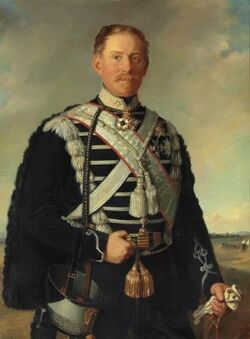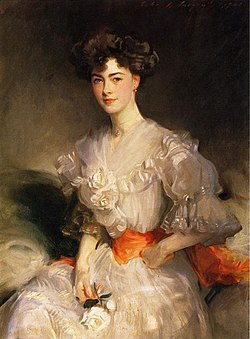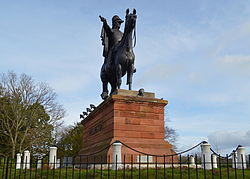Leo von Heidenstam: Difference between revisions
No edit summary |
No edit summary |
||
| Line 84: | Line 84: | ||
===War against Azmara=== | ===War against Azmara=== | ||
{{Main|King Rudolf's War}} | |||
[[File:Christian_VIII_og_Caroline_Amalie_i_salvingsdragt.jpg|250px|right|thumb|Coronation of [[Rudolf V of Geatland|Rudolf V]] and Queen Caroline. Heidenstam attended as a stand-in for his elder brother. ]] | [[File:Christian_VIII_og_Caroline_Amalie_i_salvingsdragt.jpg|250px|right|thumb|Coronation of [[Rudolf V of Geatland|Rudolf V]] and Queen Caroline. Heidenstam attended as a stand-in for his elder brother. ]] | ||
{{Main article|King Rudolf's War}} | {{Main article|King Rudolf's War}} | ||
| Line 89: | Line 91: | ||
In 1841, Heidenstam was chosen to represent his family at the {{wp|coronation}} of [[Rudolf V of Geatland]] after Heidenstam's elder brother, Karl, had fallen ill. Upon meeting Heidenstam, King Rudolf reportedly took to him and enjoyed his company. Heidenstam was a frequent guest at the royal palace and often acted as an unofficial, impromptu advisor to the king. In recognition of his services, Rudolf V promoted Heidenstam to {{wp|lieutenant colonel}} in 1843 and later to {{wp|colonel}} in 1845. At the time of his promotion, Heidenstam was the among highest ranked members of the Geatish army who did not hold official noble title or an estate. | In 1841, Heidenstam was chosen to represent his family at the {{wp|coronation}} of [[Rudolf V of Geatland]] after Heidenstam's elder brother, Karl, had fallen ill. Upon meeting Heidenstam, King Rudolf reportedly took to him and enjoyed his company. Heidenstam was a frequent guest at the royal palace and often acted as an unofficial, impromptu advisor to the king. In recognition of his services, Rudolf V promoted Heidenstam to {{wp|lieutenant colonel}} in 1843 and later to {{wp|colonel}} in 1845. At the time of his promotion, Heidenstam was the among highest ranked members of the Geatish army who did not hold official noble title or an estate. | ||
Heidenstam was called to action in Rudolf V declared war against Azmara in 1852. Although the majority of the fighting theatre was exclusive to sea skirmishes, Heidenstam was placed under the command of Field Marshal [[Björn von Beyermann]], known popularly as "Red Björn". At the war's outset, Heidenstam helped organize the standing Geatish {{wp|Marines|marine force}}. In this role he served effectively, and despite his lack of experience in traditional naval warfare was able to organize various succesful {{wp|Naval boarding|boarding parties}} against Azmaran naval vessels in the North Sea. | |||
==Field Marshal== | ==Field Marshal== | ||
Revision as of 13:34, 5 August 2020
The Duke of Dromund | |
|---|---|
 Portrait of Heidenstam in 1867 | |
| 1st Premier of Geatland | |
| In office 10 August 1867 – 12 December 1878 | |
| Monarch | Gunnar III |
| Preceded by | office created |
| Succeeded by | Baron Ingemar Ulf |
| Personal details | |
| Born | Leo Verner von Heidenstam 29 September 1798 Kungslandning, Ibsäm, Geatland |
| Died | 21 November 1882 (aged 84) Esholm, Geatland |
| Spouse | Greta Mulborg |
| Parents |
|
| Awards | |
| Signature | |
| Military service | |
| Allegiance | |
| Branch/service | Royal Geatish Army |
| Years of service | 1816–1867 |
| Rank | Field Marshal |
| Battles/wars | King Rudolf's War
|
Marshal of the Realm Leo Verner von Heidenstam, 1st Duke of Dromund (29 September 1798 - 21 November 1882) was a Geatish military commander and statesman who is most renowned for crushing the Engström Revolt and serving as Geatland's first premier. He is considered among the most predominant figures in contemporary Geatish history.
Leo von Heidenstam was born into a moderately wealthy and landed noble family in Kungslandning. As the second son of a army captain, Heidenstam was made to enlist in the Royal Geatish Army at age 18. After distinguishing himself in the army academy, Heidenstam rose rapidly through the ranks and became a captain at the age of 23 in 1821. When King Rudolf's War broke out between Geatland and Azmara, Heidenstam served with valor distinction, his most famous achievement being the siege of Fort Aalmsted in 1844. After King Rudolf's War, Heidenstam was promoted to field marshal and largely retired from his military duties, conducting mostly ceremonial matters. This changed when Gunnar III called on him to personally quell the Engström Revolt, a republican insurrection against the Geatish Crown. Heidenstam's brute force and decisive understanding of logistics proved vital in destroying the rebel forces.
After his distinguished service in the Engström Revolt, Heidenstam expected to resign from public life completely. However, in 1867 the Constitution of Geatland was ratified, and Gunnar III asked Heidenstam to serve as the nation's first premier, an offer Heidenstam reluctantly accepted. He would go on to be extremely popular in that position and enacted various policies aimed at democratizing the newly-minted constitutional monarchy and liberalizing its economy. During his ten years in office, Heidenstam established many precedents and traditions that continue in Geatland today. His most famous achievement is extending voting rights to property-less and non-Amendist men. Despite strong popular approval, Heidenstam declined to stand as premier for a fourth term in 1875, continuing an unbroken political precent in Geatland. He died in 1882 and was accorded a state funeral.
Heidenstam is among the mostly highly rated and celebrated premiers of Geatland. His military prowess as well as his close personal relationship with and understanding of his soldiers made him an extremely popular figure. He is considered the father of modern Geatland. In 2006, Heidenstam was declared the third greatest Geat to have ever lived, behind only Eric the Great and Otto IV. He and his descendants are among the only non-royal families to hold the title of duke in Geatland.
Early life and ancestry
Leo Verner von Heidenstam was born into an aristocratic Geatish family in the family's ancestral home in Kungslandning, Ibsäm County, on 29 September 1798. He was the second of four suriviving sons of Oskar von Heidenstam, Count of Kravall and Lady Marta Trausch. Through his father's side, he belonged to the von Heidenstam family, which was given landed rights around 1701. The von Heidenstams were minor nobility with limited connection to the realm's ruling royal elite. Leo was the third cousin twice removed of the reigning Geatish monarch at his birth, Eric X. His great-grandfather, Lord Sigmund von Heidenstam, was the deputy viceroy of Eldmark from 1705 to 1711.
The von Heidenstams were wealthy, though by the standards of the ruling elite they were relatively poor. Around Leo von Heidenstam's birth, the family estate had been falling into desrepair. Most of the family's wealth was reinvigorated when Oskar married Marta Trausch, the daughter of a wealthy Cislanian businessman, and thus received a large dowry. Trausch, originally a Catholic, converted to Amendism following her marriage to Heidenstam's father. Growing up, Heidenstam learned to speak Weranic through his mother, and he would hold a strong appreciation for Weranic culture for the rest of his life.
Until the age of 12, Heidenstam attended a local grammar school. Teachers often remarked that he was lonesome and shy but excelled in academia, especially in mathematics. He suffered from a bad stammer for which he was bullied and mocked. One tutor remarked that he was an "affectatious, insignificant boy of no remark." On Heidenstam's personal insistance, his father found him a private tutor, and he educated at home until he was eighteen. His father personally taught him horseback riding and shooting. In his later years, Heidenstam wrote, "I am my father's work."
Early career
Enlistment and the academy
As was tradition for young nobility, Heidenstam was enlisted into the Royal Geatish Army, an instutition he would serve for over fifty-six years. As a retired captain's son, he was destened for a career as an officer. Therefore, he was required to attend training at the King Eric VI Army Academy in Blåstad. He formally enlisted in September 1816. Training at the Academy would normally last for no more than two years at most during peacetime, even less during wartime. However, during his service at the academy, Heidenstam was frequently stricken with malaria, which rendered him bedrid. Not wishing to lose out on valuable information he may have lost while ill, Heidenstam applied for an extention of service at the Academy with the written consent of his superior officer. His petition was accepted.
While in academic training, Heidenstam was frequently praised for his erudition and sagesse. By adulthood, his stammer had disapeared, and he was commonly described as a fit and athletic man. He was frequently selected among his peers to lead parades and welcome guests. Instructors and superiors at the academy encouraged Heidenstam's veracious reading habit. In 1819, Heidenstam graduated the Academy with full distinction.
Upon his graduation from the academy, Heidenstam was immediately promoted to lieutenant. This decision was rather unprecedented, as promotions of this speed were typically reserved for the sons of high-standing nobility or members of the royal family. Upon his promotion, he was assigned as an aide-de-camp to Major Ernst Byström and stationed in Esholm. While in Esholm, Heidenstam engaged in the city's social culture, often frequently bars and gambling with fellow officers. During this time, he cultivated his skills in the violin and sometimes filled in as a reserve for various Esholm orchestras. He was, however, diligent in his duties and praised for his efficacy.
Rise to captain

In recognition of his superlative qualities and industriousness Major Byström petitioned for Heidenstam to be made a captain. Byström's petition was successful and, at the age of 23, he was gazetted in 1820. Heidenstam was one of the youngest ever militarymen to assume the position of captain who had not otherwise purchased their commission. Upon his successful promotion, Heidenstam petitioned to be sent as a military attaché to Cislania, his mother's homeland. Heidenstam's father and mother objected to his request, instead preferring that their son remain in Geatland and find a suitable, high-born woman to marry. Nevertheless, Heidenstam's request was granted and he was created the chief arms officer at the Geatish embassy in Cislania, where he began his tour on January 1821. Heidenstam's decision to leave against his family's advice created a rift between him and his father, and upon arrival in Cislania Heidenstam wrote to his mother and father less and less frequently. During his posting he would later be promoted to major.
Because he could speak Weranic at a native fluency, Heidenstam quickly rose to prominence among his fellow officers in Wiesstadt. His rank and position, as well as his connection to certain Cislanian aristocratic families through his mother, offered him entry into various high-society clubs, bars and establishments. Although these activities were not officially sanctioned by the Geatish embassy, Heidenstam's popularity and attention to duty elsewhere afforded him a degree of impunity. Contemporary accounts, however, relate that Heidenstam's free-going nature landed him in some trouble. In August 1822, for instance, Heidenstam was admonished for entering into a drunken brawl.
Most of Heidenstam's time was occupied in reading and research. Disgruntled by the lack of military manuals and literature in his native land, Heidenstam read videly in tactical combat, military history, and military supply-chain management. After his service in Cislania finished, Heidenstam brought back many of his Weranic books to Geatland. They would go on the be extremely formative in his command style. During this time, Heidenstam reunited briefly with his mother's family and was reintroduced to Catholicism. Although he was choose not to convert, he reportedly greatly sympathized with the religion. Many scholars have taken this to reflect Heidenstam's tolerant stance towards Catholics in Geatland, especially as regards his decision to give Catholic men voting rights and to allow Catholic churches limited rights to proselytize.
Marriage
In April 1823, while at a dinner party hosted by the Amendist Mulborg family, Heidenstam met Greta Mulborg, the youngest of four daughters. Heidenstam initially dismissed Mulborg as too affectacious and childlish, though he soon developed a close affinity for her, and he would often visit the Mulborg family residence in downtown Weisstadt in order to see Greta. In his private journals, Heidenstam wrote longingly of Greta's youth and nymphlike beauty. In a letter to his mother, Heidenstam wrote: "She [Greta] is surely the most beautiful creature in all of Creation." Although the Mulborg family entended for Geta to be betrothed to another man, they warmed up to the match. Though the Mulborgs were wealthy, they were not nobility and therefore cherished the opportunity to marry into the landed upper class. Heidenstam formally proposed marriage in December 1823 to Greta's father, who accepted.
Privately, Heidenstam's father staunchly opposed the marriage and instead wished that his sons to marry into Geatish nobility. When the Mulborg family promised a large dowry, however, his father tacitly accepted the marriage proposal. The army gave Heidenstam leave to return to Geatland for a month and marry. They couple were wed in the garden of Heidenstams' ancestral home in Kungslandning on 6 July 1824. Soon after the wedding was over, however, it was revealed that much of what the Mulborg family promised as a dowry was fabricated. Although he condemned divroce, Heidenstam's father was furious with Greta and his son. Heidenstam was also disapointed with his new family in law, though he chose to return to his posting in Cislania. Heidenstam would grow very close and loyal with his wife; there is no evidence Heidenstam or Greta were unfaithful to each other despite both often undergoing months of separation. In 1836, Greta gave birth to the couple's first son, Oskar.
In 1925, Heidenstam's father contracted pneumonia and died. Upon hearing of the news, Heidenstam was heartbroken, especially since he could not return to Geatland to see his father off owing to logistical constraints. Heidenstam particularly regretted having soured his relationship with his father, and he was particularly devestated to learn that no lands were left for him, effectively making him reliant on his income and pension from the army.
Heidenstam was still stationed in Weisstadt when the Weranian Revolution of 1828, a republican revolt, erupted in Werania. The events quickly escalated into the establishment of a second Weranian republic and the overthrow of the Cislanian royal family in favor of the appointment of Ulrich von Bayrhoffer as Minister-President of Cislania. Heidenstam and his wife were therefore forced to flee to Geatland. On his return, Heidenstam railed seethingly against republicanism in his private journals and lobbied for army leaders to follow the events in Cislania more closely, to no avail. Heidenstam published a few anti-republican pamphlets, though because republicanism was not yet a widespread movement in Geatland they were only in limited circulation.
War against Azmara

Upon returning to the Geatish Islands, Heidenstam and his wife settled down in Blåstad, where the family would raise the rest of their children. Heidenstam took up a post at the King Eric VI Army Academy, his former place of study. His instruction at the academy was mainly devoted to discipline and regimen. As a second son and therefore minor nobility, he was offered very little room for advancement beyond his rank of major. Heidenstam wrote often to his wife and family complaining about the assignment, as Heidenstam would have preferred to teach army strategy and logistics. Nevertheless, Heidenstam's position as chief disciplinarian grew on him, and when offered a chance to transfer to an academic position, Heidenstam reportedly refused.
In 1841, Heidenstam was chosen to represent his family at the coronation of Rudolf V of Geatland after Heidenstam's elder brother, Karl, had fallen ill. Upon meeting Heidenstam, King Rudolf reportedly took to him and enjoyed his company. Heidenstam was a frequent guest at the royal palace and often acted as an unofficial, impromptu advisor to the king. In recognition of his services, Rudolf V promoted Heidenstam to lieutenant colonel in 1843 and later to colonel in 1845. At the time of his promotion, Heidenstam was the among highest ranked members of the Geatish army who did not hold official noble title or an estate.
Heidenstam was called to action in Rudolf V declared war against Azmara in 1852. Although the majority of the fighting theatre was exclusive to sea skirmishes, Heidenstam was placed under the command of Field Marshal Björn von Beyermann, known popularly as "Red Björn". At the war's outset, Heidenstam helped organize the standing Geatish marine force. In this role he served effectively, and despite his lack of experience in traditional naval warfare was able to organize various succesful boarding parties against Azmaran naval vessels in the North Sea.
Field Marshal
Engström Revolt
Premiership
Domestic policy
Foreign policy
Universal male suffrage
Decision to retire
Later life
Death and funeral
— Heidenstam's famous last words



